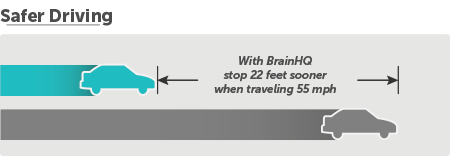Published Research on BrainHQ and Driving Safety
 Driving a car requires a lot of brainpower. One of the most important cognitive abilities for driving is “useful field of view”—the area from which you can take in information with a single glance. (At least one study has shown that a useful field of view test is
Driving a car requires a lot of brainpower. One of the most important cognitive abilities for driving is “useful field of view”—the area from which you can take in information with a single glance. (At least one study has shown that a useful field of view test is  more accurate than a vision test for safe driving!) Useful field of view tends to get smaller with age, meaning that we take in less of the visual field in front of us. So if a bicycle, truck, or skateboarder comes at us from the side, we might not spot it in time to slam on the brakes.
more accurate than a vision test for safe driving!) Useful field of view tends to get smaller with age, meaning that we take in less of the visual field in front of us. So if a bicycle, truck, or skateboarder comes at us from the side, we might not spot it in time to slam on the brakes.
Six published papers have shown that a BrainHQ exercise—Double Decision—is a great tool for improving useful field of view and driving safety. Among other things, these studies have shown that when drivers (in some cases, drivers with slower visual processing than normal) train on Double Decision, they:
 Make 38% fewer dangerous driving maneuvers
Make 38% fewer dangerous driving maneuvers Can stop 22 feet sooner when driving 88 kilometers per hour (55 miles per hour)
Can stop 22 feet sooner when driving 88 kilometers per hour (55 miles per hour) Feel more confident driving in difficult conditions (such as at night, in bad weather, or in new places)
Feel more confident driving in difficult conditions (such as at night, in bad weather, or in new places) Cut their at-fault crash risk by 48%
Cut their at-fault crash risk by 48% Keep their license later in life
Keep their license later in life
The exercises do this by speeding up visual processing, expanding useful field of view, and training users to keep track of many moving parts at once. And this can make the difference between a near miss and a bad crash!
Information and citations for studies on BrainHQ assessment on training and driving
In general, these studies were conducted in cognitively healthy adults aged 65 and older, and in some cases, aged 50 and older. Remember that studies show average results, and that individual results will vary. Where published studies make reference to clinical populations, it is for informational purposes only. BrainHQ is not intended to diagnose or treat any clinical condition.
Cognitive training decreases motor vehicle collision involvement of older drivers
Ball et al. (2010)
Journal of the American Geriatrics Society
View article
The longitudinal impact of cognitive speed of processing training on driving mobility
Edwards et al. (2009)
The Gerontologist
View article
Cognitive speed of processing training delays driving cessation
Edwards et al. (2010)
Journal of Gerontology, Series A
View article
Speed-of-processing and driving simulator training result in improved driving performance
Roenker et al. (2003)
Human Factors
View abstract
The impact of three cognitive training programs on driving cessation across 10 years: A randomized controlled trial
Ross et al. (2017)
The Gerontologist
View article
The transfer of cognitive speed of processing training to older adults’ driving mobility across 5 years
Ross et al. (2016)
Journals of Gerontology, Series B
View article






 English
English
 Français
Français
 Driving a car requires a lot of brainpower. One of the most important cognitive abilities for driving is
Driving a car requires a lot of brainpower. One of the most important cognitive abilities for driving is  more accurate than a vision test for safe driving!) Useful field of view tends to get smaller with age, meaning that we take in less of the visual field in front of us. So if a bicycle, truck, or skateboarder comes at us from the side, we might not spot it in time to slam on the brakes.
more accurate than a vision test for safe driving!) Useful field of view tends to get smaller with age, meaning that we take in less of the visual field in front of us. So if a bicycle, truck, or skateboarder comes at us from the side, we might not spot it in time to slam on the brakes.


